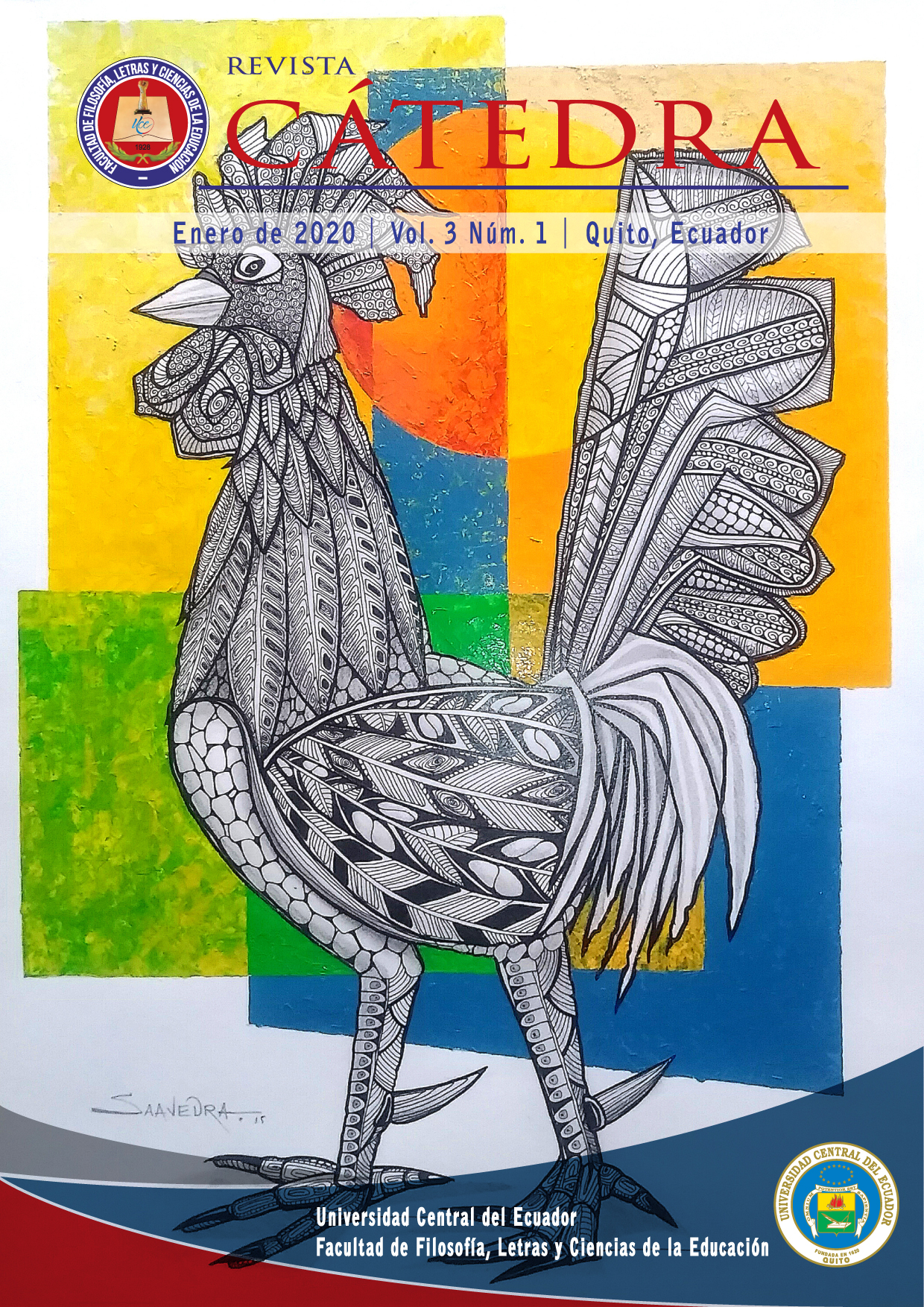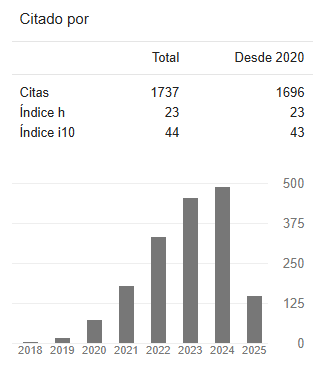Perceptions for inclusive education in Ecuador
DOI:
https://doi.org/10.29166/catedra.v3i1.1903Keywords:
teaching, innovation, inclusion, pedagogy, practiceAbstract
The aim of this article is to carry out the analysis of the educational inclusion policy in Ecuador and its relationship with the pedagogical actions in force in educational settings. The education systems of the Ecuadorian state, despite being aligned with international inclusion parameters, have not overcome the discrimination gap for people with special educational needs (SEN). This document mainly contributes to innovation in the pedagogical thinking of teachers, for this reason, part of the Warnock report (document that was prepared by the British Education Commission) which revolutionizes the way of thinking of people when revealing that “There are no uneducable children” (Warnock, 1987, p. 15). The methodology used in the structuring of this work is inductive - deductive and is based on bibliographic research. The results of this study reveal shortcomings and difficulties in the educational inclusion of students with SEN, the most relevant problems observed were the conceptual deficiencies around educational inclusion, poor knowledge about an inclusive curriculum and weaknesses in a supposed homogeneity in the classroom. This document briefly presents some perspectives and challenges to promote inclusive thinking but, above all, a thinking open to diversity.
Downloads
References
Asamblea Nacional Ecuador, (2008). Constitución de la República del Ecuador. Recuperado el 15 de 08 de 2019, de http://www.asambleanacional.gob.ec/sites/default/files/documents/old/constitucion_de_bolsillo.pdF
CIE (2008). 48ª reunión de la Conferencia Internacional de Educación. Inclusión Educativa el camino del futuro un desafìo para compartir – UNESCO. Recuperado el 24 de 08 de 2019, de http://www.ibe.unesco.org/fileadmin/user_upload/COPs/News_documents/2007/0710PanamaCity/Documento_Inclusion_Educativa.pdf
CONADIS. (2014). Ley Orgánica de Discapacidades. Recuperado el 23 de 08 de 2019 de https://www.consejodiscapacidades.gob.ec/biblioteca/
Medina Salgado, C., y, Espinosa Espíndola, M. T. (1994). La innovación en la organizaciones modernas. Gestión y Estrategia, (5), 54-63.
MINEDUC. (2006). Plan Decenal de Educación del Ecuador 2006 - 2015. Quito: Consejo Nacional de Educación.
MINEDUC. (2010). Rendición de cuentas 2009: La Revolución Educativa para el Buen Vivir. Obtenido de https://educacion.gob.ec/wp-content/uploads/downloads/2012/08/Rendicion_2009.pdf
MINEDUC. (2012). Diseño e Implementación del Nuevo Modelo de Educaciòn Inclusiva. Recuperado de 04 de 08 de 2019 de: https://educacion.gob.ec/wp-content/uploads/downloads/2018/04/Proyecto-Modelo-de-Educacion-Inclusiva.pdf.
MINEDUC. (2013). Acuerdo Ministerial Nº 0295-13. Recuperado el 23 de 08 de 2017, de https://educacion.gob.ec/wp-content/uploads/downloads/2013/08/ACUERDO_295-13.pdf
MINEDUC (2014). Subsecretaria de Coordinación Educativa. Quito, Ecuador. Recuperado el 01 de 09 de 2017, de https://educacion.gob.ec/wp-content/uploads/downloads/2014/03/9.1-SUBSECRETARIA-DE-COORDINACION-EDUCATIVA.pdf
MINEDUC (2016) Manual Nacional de Gestión y Atenciòn Educativa Hospitalaria y Domiciliaria. Recuperado de: https://educacion.gob.ec/informacion-programa-aulas-hospitalarias/
MINEDUC (2017a) Ley Orgánica de Educación Intercultural. Recuperado el 31 de 07 de 2019 de: https://educacion.gob.ec/wp-content/uploads/downloads/2017/02/Reglamento-General-a-la-Ley-OrgAnica-de-Educacion-Intercultural.pdf
MINEDUC (2017b) DECE Departamento de Consejeria Estudiantil. Recuperado el 22 de 08 de 2019, de https://educacion.gob.ec/que-son-los-dece/
MINEDUC (2018) Ministerio de Educación del Ecuador. Recuperado el 22 de 08 de 2019, de Tres programas del Ministerio de Educación fortalecen la calidad e inclusión educativa: https://educacion.gob.ec/tres-programas-del-ministerio-de-educacion-fortalecen-la-calidad-e-inclusion-educativa/
MINEDUC. (2019). Educación especializada e inclusiva. Recuperado el 09 de 12 de 2019, de: https://educacion.gob.ec/unidad-de-apoyo-a-la-inclusion-udai/
ONU (1982) Normas Uniformes de la Organización de las Naciones Unidas sobre la igualdad de Personas con Discapacidad, Resolución 46/96. Recuperado el 12 de 08 de 2017, de http://www.aspaym-asturias.es/images/stories/documentos/Legislacion/onu/normas_uniformes_de_la_onu_sobre_la_igualdad_de_oportunidades_para_las_personas_con_discapacidad_resolucion_46-96_de_20_de_diciembre_de_1993_aspaym.pdf
Sandoval, L. y Martínez, J, (2018). Universidad UTE / CC BY Tsafiqui, Revista de investigación científica, Nº 11, 2018
Sarto Martín, M.P. y Venegas Renauld, M.E. (2009) Aspectos claves de la inclusión educativa Publicaciones del INICIO, Colecciones de Investigación. Salamanca.
SENPLADES (2017) Plan Nacional de Desarrollo. Recuperado el 21 de 08 de 2019 de: http://www.planificacion.gob.ec/wp-content/uploads/downloads/2017/10/PNBV-26-OCT-FINAL_0K.compressed1.pdf
SETEDIS (2009) Programa Misión Solidaria Manuela Espejo: Secretaria Técnica de Discapacidades. Recuperasdo de 16 de 12 de 2019 de: https://plataformacelac.org/programa/43
UNESCO (1948) Declaración Mundial de los Derechos Humanos. Recuperado de http://www.ohchr.org/EN/UDHR/Documents/UDHR_Translations/spn.pdf
UNESCO (1960) Convención relativa a la lucha contra las discriminaciones en la Esfera de la Enseñanza. Recuperado el 01 de 09 de 2019, de http://portal.unesco.org/es/ev.php- URL_ID=12949&URL_DO=DO_TOPIC&URL_SECTION=201.html
UNESCO (1994) Conferencia Mundial sobre Necesidades Educativas Especiales: Acceso y Calidad: informe final. Recupeprado el 02 de 09 de 2019, de https://unesdoc.unesco.org/ark:/48223/pf0000098427_ara?posInSet=2&queryId=N-EXPLORE-e1713b76-4bb1-4c5b-be6b-241d66525b04
UNESCO (1998) Comisión Internacional sobre la Educación para el siglo XXI. Recuperado el 19 de 11 de 2019, de: https://uom.uib.cat/digitalAssets/221/221918_9.pdf
UNESCO (2000) Marco de Educación de Dakar, Educación para todos. Recuperado el 09 de 09 de 2019, de: file:///F:/TESI/Lineamient%20Internacinales/4.%20arco%20de%0Acción%20d%20Dakar%22000.pdf
UNESCO (2004) Observatorio digital de la Educación Superior en América Latina y el Caribe. Recuperado el 10 de 09 de 2019, de http://unesdoc.unesco.org/images/0014/001404/140488s.pdf
UNESCO (2015) Educación inclusiva. Recuperado el 23 de 08 de 2019, de http://es.unesco.org/world-education-forum-2015/5-key-themes/educacion-inclusiva
UNESCO (05 de 2016) Agenda 2030 y los Objetivos de Desarrollo Sostenible: Una oportunidad para América Latina y el Caribe. Obtenido de http://www.sela.org/media/2262361/agenda-2030-y-los-objetivos-de-desarrollo-sostenible.pdf
WARNOCK, M. (1987) Encuentro sobre Necesidades de Educación Especial. En Revista de Educación, Número Extraordinario, pp. 45-73.
Downloads
Published
Versions
- 2021-01-07 (5)
- 2021-01-07 (4)
- 2020-11-17 (3)
- 2020-09-03 (2)
- 2020-01-22 (1)









